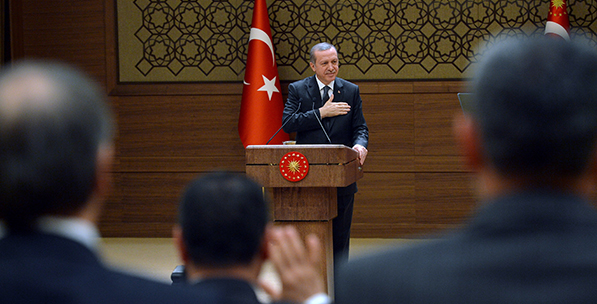Addressing a group of academics and think tank affiliates at the Presidential Palace, President Recep Tayyip Erdoğan recently claimed that his 13-year experience guided his recommendation for adopting a presidential system, an issue that he introduced ahead of the 2015 parliamentary elections. Erdoğan said that he refrained from sharing a range of problems under President Ahmet Necdet Sezer with the general public, while adding that Turkey originally committed to a "system update" with the 2007 referendum that amended the 1982 Constitution to let the people directly elect the president instead of delegating their power to Parliament. Noting that opposition parties were unwilling to cooperate on this issue during the inconclusive proceedings at the parliamentary Constitutional Reconciliation Commission, Erdoğan reiterated that the people will have the final word on a civilian constitution with greater emphasis on democratization: "Now, the masses will decide."
At the meeting, Erdoğan did not recommend a specific type of presidential system and, instead, argued that the country could avoid mimicry and design an original presidential system. While the participants agreed that the government no longer qualified as a parliamentary system, the vast majority supported the view that there was genuine need for presidentialism. Noting that Erdoğan's strong leadership represented an opportunity for system change, academics argued that there was still need to better inform the people about the proposed system and address the opposition's concerns, including the prospect of federalism, executive authoritarianism and the alleged lack of room for opposition.
The main theme of the meeting related to Turkey's need to design a unique type of presidential system in light of its own democratic progress. The word "unique" here indicates at least two things. First, the model should respect the needs of Turkish politics and therefore not simply copy existing practices, which the general population would welcome. Second, an implication to be treated carefully, the new model cannot reproduce the anti-democratic elements of the existing system that the Justice and Development Party (AK Party) itself has been striving to reform for the past 13 years. As such, a Turkish-style presidential system debate must not lose sight of democratic consolidation while addressing issues beyond executive power including the rule of law, the importance of Parliament and separation of powers.
A public debate as such would not only help consolidate Turkey's democracy, but also address the opposition's concerns and fears. Otherwise, opposition parties might opt for extra-parliamentary measures including street demonstrations in protest of certain public policies. With the memories of the 2013 Gezi Park protests and the 2014 Kobani protests still fresh, engaging the a debate on a presidential system with reference to democratization and a new constitution would help avoid additional tensions and acts of provocation.
Even if the AK Party were to claim a super-majority in Parliament, the country's transition to a presidential system will take some time. In order to manage the process successfully, the government will have to work with the president on discourse and in practice.
[Daily Sabah, February 21, 2015]









